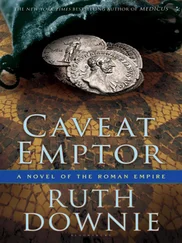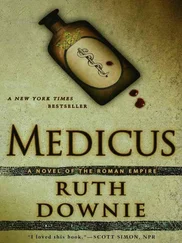Ruth Downie - Semper Fidelis
Здесь есть возможность читать онлайн «Ruth Downie - Semper Fidelis» весь текст электронной книги совершенно бесплатно (целиком полную версию без сокращений). В некоторых случаях можно слушать аудио, скачать через торрент в формате fb2 и присутствует краткое содержание. Жанр: Исторический детектив, на английском языке. Описание произведения, (предисловие) а так же отзывы посетителей доступны на портале библиотеки ЛибКат.
- Название:Semper Fidelis
- Автор:
- Жанр:
- Год:неизвестен
- ISBN:нет данных
- Рейтинг книги:5 / 5. Голосов: 1
-
Избранное:Добавить в избранное
- Отзывы:
-
Ваша оценка:
- 100
- 1
- 2
- 3
- 4
- 5
Semper Fidelis: краткое содержание, описание и аннотация
Предлагаем к чтению аннотацию, описание, краткое содержание или предисловие (зависит от того, что написал сам автор книги «Semper Fidelis»). Если вы не нашли необходимую информацию о книге — напишите в комментариях, мы постараемся отыскать её.
Semper Fidelis — читать онлайн бесплатно полную книгу (весь текст) целиком
Ниже представлен текст книги, разбитый по страницам. Система сохранения места последней прочитанной страницы, позволяет с удобством читать онлайн бесплатно книгу «Semper Fidelis», без необходимости каждый раз заново искать на чём Вы остановились. Поставьте закладку, и сможете в любой момент перейти на страницу, на которой закончили чтение.
Интервал:
Закладка:
“Hearing about the sacrifice to Jupiter seems to have settled them down a bit, sir,” said Geminus. “And they took heart from what you told them about Deva. We shouldn’t have too much trouble on the march.”
The recruits Ruso had met seemed glum rather than rebellious. It had not occurred to him that there might be any trouble on the long march west to legionary headquarters, but as he listened to the practical arrangements for packing and transport being discussed around him, it became evident that the recruits were being treated with a certain wariness.
“As soon as we get them back to base,” said Accius, dabbling his hands in the finger bowl held out to him by one of the slaves, “they’ll be split up between the centuries.” He smiled. “And while the rest of us continue to endure the ghastly conditions on this island, Geminus, you’ll be sitting in the sunshine on your little farm in Campania.”
Geminus inclined his head and said, “I shall, sir,” without a trace of humor.
Ruso reflected that Hadrian, who insisted on mixing with the ranks and sharing a military diet, was probably the only man in the army who did not grumble about his working conditions. No doubt the incoming troops would have plenty to say about the state in which the Twentieth had left the fortress at Eboracum. Meanwhile the Twentieth would have the satisfaction of knowing that the headquarters and their one occupied corner showed they were civilized men, even though they had long ago stripped the remaining buildings of anything that might contribute to the domestic bliss of their successors. Anyone who imagined that the legions were happily united in the service of the emperor was woefully naive.
Reaching for a spoonful of the fish with leeks that had been a favorite recipe of his first wife, it occurred to Ruso that Claudia would not have been impressed with his conduct so far this evening. You must make an effort, Gaius! Do try and join the conversation. People will think you don’t approve of them! He doubted they cared whether he approved of them or not, but it was clear he was not going to find out anything interesting unless he asked.
“I was wondering, sir,” he put in when they seemed to have run out of things to say about the crop yields of the farm Geminus had bought in Campania, “why the recruits were sent here instead of being trained at Deva.”
“Because somebody has to garrison Eboracum while everyone’s up on the border building the emperor’s wall,” explained the tribune, as if it were obvious.
“And they look like soldiers to the natives,” added Geminus.
“Ah,” said Ruso, suspecting he now appeared dim rather than sociable, and not sure what to say next.
“It was thought,” continued Accius, helpfully filling the silence, “that if we trained them over here, they wouldn’t pick up bad habits from the older men back at Deva.”
“But it turned out they’d got plenty of their own,” observed Geminus.
“You’ve all done everything that could possibly be asked of you,” Accius assured the centurions. “I saw that for myself this afternoon.”
Geminus said, “I should have got rid of that lad before, sir. But sometimes a recruit like that comes good.”
Dexter wiped his bowl with a chunk of bread. “You can’t do anything with a man whose mind has gone.” He crammed the bread into his mouth as if there were nothing more to be said on the subject.
Ruso felt there was a great deal more to be said, but not here. Instead he reached for the water jug. “So how did they get the idea they were cursed?”
No one replied. He glanced up. The others were looking at him as if he were an earwig that had just crawled out of their lettuce. He had a feeling this was not the sort of reaction Claudia would have intended.
“The curse of the Britons,” said Geminus finally, “is that they don’t do what they’re told. A couple of them found out the hard way that they should have paid more attention in swimming practice.”
“Geminus dived in and rescued one of them himself,” said Accius, as if he were afraid his relative might be too modest to mention it.
“Lost the other one downstream.” Geminus shook his head, acknowledging defeat. “Then this week we lost one in a training accident, and they’ve put the two together and made up some tale that means none of it’s their own fault.” He clapped his glass down on a side table as if signaling the end of this depressing subject and turned to Accius. “I noticed the mention of discipline in your speech, sir. Very appropriate.”
“Ah, yes.” Accius reached for his own wine. “Of course, you know why we have altars to Disciplina.”
“To encourage the men, sir?” ventured the plump one.
“The same reason we have coins celebrating Concordia,” said Accius, taking a sip and looking around the room. “Because we like to pretend we’ve got it.”
“We do, sir,” agreed Geminus. The plump centurion gave a grunt that might or might not have been assent, the thin one looked round for a cue, and the silent one busied himself with his dinner.
Ruso wondered how much wine Accius had drunk. The wording stamped on coins was chosen at the very top, and-given the bad relations between the Senate and Hadrian-it was hardly tactful for the son of a senator to be heard criticizing imperial policy in a building where any member of the staff could be a spy. The spies, on the other hand, would not be anywhere near as interested as Ruso was in the loss of a few unimportant Britons-something Accius should have been concerned about but apparently wasn’t.
“I was wondering, sir,” he said, “if the second recruit who died had been in some sort of a fight.”
Geminus frowned. “Where did you get that from?”
Too late, Ruso realized that a fight might suggest Geminus had failed to keep control, whereas an accident could be blamed on the gods. “The body,” he said, unable to think of a suitable lie and wishing the tribune had found some women to invite. Women were good at filling embarrassing silences. Except for Tilla, who was good at creating them.
This time it was Accius who restarted the conversation. “Did Geminus ever tell you,” he said to the centurions, “how he and I first met?”
The fat and the thin centurions greeted this opening with the eagerness of men stranded on a lonely road spying an approaching carriage. The silent one did not appear to notice.
“We’re related, you know,” Accius explained. “On my mother’s side.”
Ruso, who knew this much already, surmised that Geminus was a useful sort of relative: distant enough not to be a social embarrassment but close enough to be claimed as family when he had marched home from the Dacian campaign, his chest sparkling with decorations for bravery. Apparently the eight-year-old Accius had been escorted onto the streets of Rome to watch him in the victory parade. Later, he had followed Geminus around the house asking every question he could think of about life in the army.
Geminus’s hard features softened slightly as his protege reminded him of the marching lessons around the fishpond in the garden, and how Accius had taken to demanding the day’s watchword before allowing anyone to enter his presence.
“Do you remember that wooden sword you gave me?”
“Very well, sir.”
“Did Mother ever tell you Father confiscated it? I knocked over one of the statues in the garden while I was practising the thrust and twist. I wrote to the praetorian barracks to ask you for another one, but I think the slave must have been told to lose the letter.”
“I never got it, sir.”
“And finally, after all these years, I heard we were serving in the same province and I had the chance to thank you.”
Читать дальшеИнтервал:
Закладка:
Похожие книги на «Semper Fidelis»
Представляем Вашему вниманию похожие книги на «Semper Fidelis» списком для выбора. Мы отобрали схожую по названию и смыслу литературу в надежде предоставить читателям больше вариантов отыскать новые, интересные, ещё непрочитанные произведения.
Обсуждение, отзывы о книге «Semper Fidelis» и просто собственные мнения читателей. Оставьте ваши комментарии, напишите, что Вы думаете о произведении, его смысле или главных героях. Укажите что конкретно понравилось, а что нет, и почему Вы так считаете.












